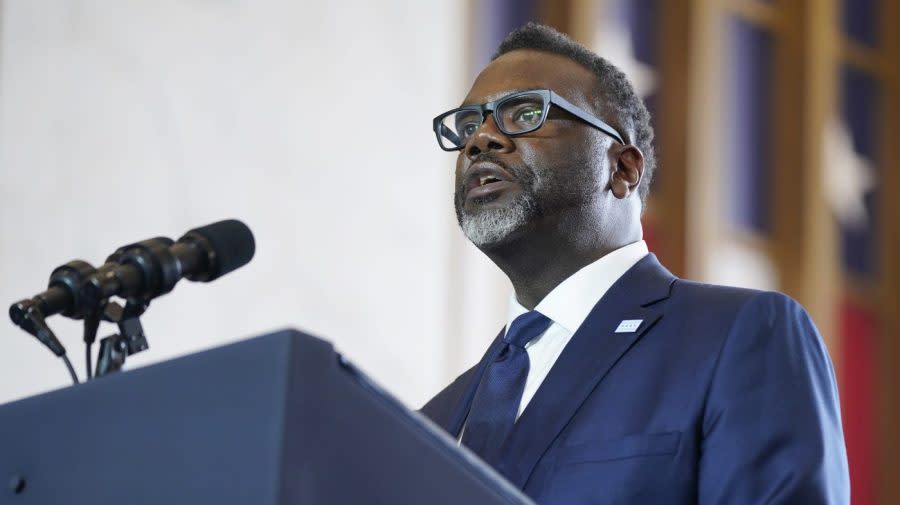Chicago sues oil companies for impacts of climate change

The city of Chicago sued six major oil companies and the primary fossil fuel lobbying group Tuesday, alleging they funded and planned a campaign of climate change denial that directly affects the city’s residents.
In the lawsuit, the city accused BP, Chevron, ConocoPhillips, Exxon Mobil, Phillips 66, Shell, and the American Petroleum Institute (API) of misleading the public about the impact of their products and of contributing to the effects of climate change on Chicago.
These impacts include unsafe summer temperatures, an increase in extreme weather, shoreline erosion and susceptibility to disasters such as flash flooding in basements on the city’s West Side, according to the lawsuit. As a result, the city says, climate mitigation and response projects in low-income communities have cost it nearly $200 million.
The complaint also singles out the API for accusations it created front groups “to promote climate disinformation and advocacy from a purportedly objective source.” The accusation echoes remarks made by Exxon Mobil lobbyist Keith McCoy to an activist in 2021 while being covertly recorded that the company “aggressively [fought] against some of the science” on climate. Exxon has disclaimed responsibility for McCoy’s comments and said they do not represent the view of the company.
“There is no justice without accountability,” Mayor Brandon Johnson (D) said in a statement Tuesday. “From the unprecedented poor air quality that we experienced last summer to the basement floodings that our residents on the West Side experienced, the consequences of this crisis are severe, as are the costs of surviving them. That is why we are seeking to hold these Defendants accountable.”
Numerous states and municipalities have filed similar lawsuits in recent years, but Chicago, the nation’s third-largest city, is one of the biggest individual municipalities to sue thus far. In 2021, the administration of then-New York City Mayor Bill de Blasio (D) sued Exxon Mobil, Shell, BP and the API.
“The record of the past two decades demonstrates that the industry has achieved its goal of providing affordable, reliable American energy to U.S. consumers while substantially reducing emissions and our environmental footprint,” API Senior Vice President and General Counsel Ryan Meyers said in a statement to The Hill. “This ongoing, coordinated campaign to wage meritless, politicized lawsuits against a foundational American industry and its workers is nothing more than a distraction from important national conversations and an enormous waste of taxpayer resources. Climate policy is for Congress to debate and decide, not a patchwork of city halls and courts.”
“The Shell Group’s position on climate change has been a matter of public record for decades. We agree that action is needed now on climate change, and we fully support the need for society to transition to a lower-carbon future. As we supply vital energy the world needs today, we continue to reduce our emissions and help customers reduce theirs,” Shell told The Hill in a statement. “Addressing climate change requires a collaborative, society-wide approach. We do not believe the courtroom is the right venue to address climate change, but that smart policy from government and action from all sectors is the appropriate way to reach solutions and drive progress.”
“Addressing climate change requires a coordinated international policy response, not meritless local litigation over lawful and essential energy production,” Theodore J. Boutrous Jr. of Gibson, Dunn and Crutcher, counsel for Chevron, said in a statement to The Hill. “As the U.S. Court of Appeals for the Second Circuit held in dismissing a similar New York City lawsuit, ‘such a sprawling case is simply beyond the limits of state law.’”
“While we generally don’t comment on pending litigation, we can say that efforts around energy and climate solutions are best addressed outside the courtroom,” a spokesperson for Phillips 66 told The Hill in a statement. “To that end, we believe a lower carbon future is better achieved by working collaboratively with government.”
Spokespeople for ConocoPhillips and BP told The Hill they would not comment on active litigation.
The Hill has reached out to Exxon Mobil for comment.
Updated at 1:00 p.m. ET
For the latest news, weather, sports, and streaming video, head to The Hill.


